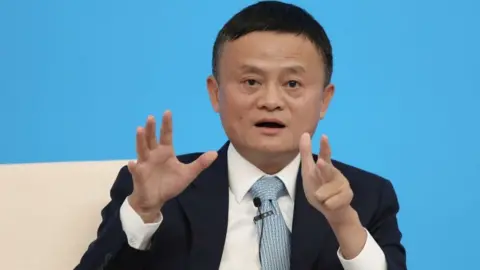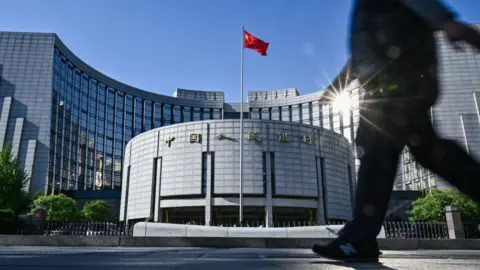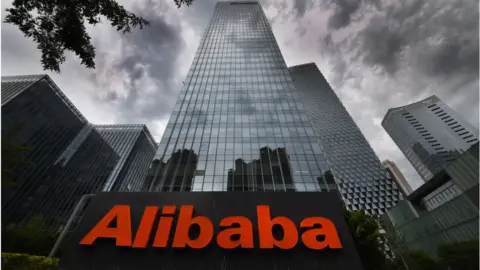Is the Ant Group shake-up a sign of things to come?
 Getty Images
Getty ImagesChina’s central bank hauled in executives from Ant Group over the weekend, and ordered a major shake-up of the company’s operations.
The move comes about a month after regulators scuppered the company’s listing on the Hong Kong and Shanghai exchanges.
Some see the move as a vengeful communist party lashing out at the company’s outspoken founder Jack Ma.
But analysts note that reforming the financial sector is a long-standing policy goal, and other companies could also end up in the crosshairs of regulators.
“Ant Financial is the first cab off the rank when it comes to these new requirements and an increased level of scrutiny,” said Michael Norris, research and strategy lead at AgencyChina.
“While the talk about palace intrigue between Jack Ma and his various detractors is titillating, it does ignore that policy environment where slowing up the build-up of risk is clear and resolute as a priority.”
Ant Group is China’s biggest payments provider, with more than 730 million monthly users on its digital payments service Alipay. But it’s the company’s lending practices that appears to worry the regulators more.
Ant acts as a marketplace for loans. It takes a fee to match borrowers with banks, who then take on the risk.
What happened to Ant?
Over the weekend central bank officials met with executives from Ant Group, and ordered the company to “rectify” its lending, insurance and wealth management services.
According to People’s Bank of China (PBOC) Vice Governor Pan Gongsheng, regulators drew attention to Ant’s poor corporate governance, defiance of regulatory demands and its use of its market size to squeeze out competitors.
Ant was urged to return to its origins as a payments business, and to enhance transaction transparency and avoid unfair competition.
 Getty Images
Getty ImagesMr Pan also said Ant should be properly licensed to operate a credit business, should establish a holding company, and must ensure capital adequacy.
Under draft rules published by the People’s Bank of China in November, online lenders must provide at least 30% of any loan they fund jointly with banks.
In other words, under the new rules Ant Group will be expected to behave a little more like a traditional lender.
Hangzhou-based Ant Group said in a statement it would establish a “rectification” working group and fully implement regulatory requirements.
Risky business
Mr Norris said it appears the regulators are worried that easy credit could mean investors will borrow on margin to make risky investments in shares.
This isn’t a new concern in China. Easy access to credit helped fuel share market turbulence in 2015, when some investors were unable to repay their margin loans after a share market rout.
Also, if Ant Group bears none of the risk, then its main incentive is to process as many loans as possible, with little regard to the effect they might have on the lending institutions that actually underwrite them.
“The regulators would much prefer the risk is shared between the platform and the financial institution, and that the financial institution has a greater oversight of the lending practices and the matching criteria that are going on,” Mr Norris said.
“Pawn shops”
The Chinese regulators first moved to rein in Ant Group shortly before its planned Initial Public Offering (IPO) in early November.
The move came after Ant Group’s billionaire founder and controlling shareholder Jack Ma had criticised China’s state-dominated banking sector at a fintech conference in Shanghai.
Mr Ma likened China’s banks to “pawn shops” and lamented their lack of innovation.
The timing of the crackdown fuelled speculation that his speech had offended the top echelons of the communist party, who had responded by cracking down on Ant Group.
Nearly two months later, the regulators still appear to be interested in Mr Ma. In addition to its moves against Ant Financial, last week China’s antitrust authorities said they had launched a probe into Mr Ma’s e-commerce platform Alibaba.
He has been advised by the Chinese government to stay in the country, Bloomberg reported.
 Getty Images
Getty ImagesNo-one is immune
But even if high ranking party officials bear a grudge against Mr Ma (something they’re unlikely to confirm publicly) that doesn’t mean the authorities don’t have legitimate concerns about the emerging financial technology sector.
Ant might have been the first fintech company to be hauled before the regulators, but it’s unlikely to be the last. Many other large players have waded into the industry, including Tencent and Alibaba’s e-commerce competitor JD.com.
Already, some of Ant Group’s competitors are changing the way they operate ahead of major changes in the rules. For example, online providers JD Digits, Tencent, Baidu and Lufax all stopped selling interest-bearing deposits on their platforms after Ant was forced by regulators to do the same.
“I don’t think anyone’s immune at this stage, and certainly the principles by which Ant Group matches consumers and financial products is broadly similar to the way that Tencent does the same,” said Mr Norris.
